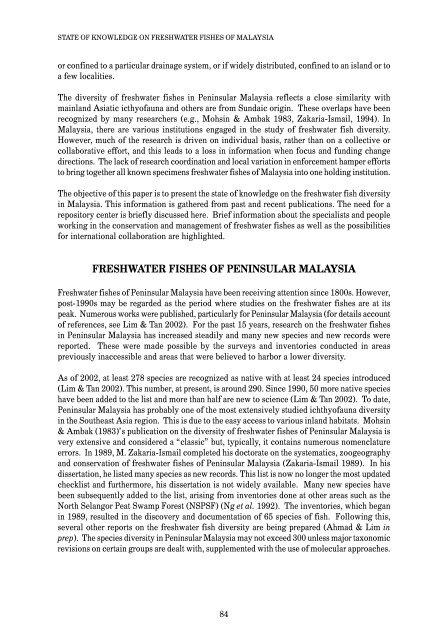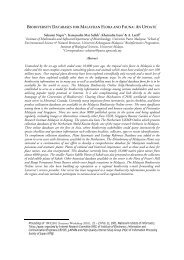o_19ko2dt161ng2j4e1tgnoqv1s45a.pdf
You also want an ePaper? Increase the reach of your titles
YUMPU automatically turns print PDFs into web optimized ePapers that Google loves.
STATE OF KNOWLEDGE ON FRESHWATER FISHES OF MALAYSIA<br />
or confined to a particular drainage system, or if widely distributed, confined to an island or to<br />
a few localities.<br />
The diversity of freshwater fishes in Peninsular Malaysia reflects a close similarity with<br />
mainland Asiatic icthyofauna and others are from Sundaic origin. These overlaps have been<br />
recognized by many researchers (e.g., Mohsin & Ambak 1983, Zakaria-Ismail, 1994). In<br />
Malaysia, there are various institutions engaged in the study of freshwater fish diversity.<br />
However, much of the research is driven on individual basis, rather than on a collective or<br />
collaborative effort, and this leads to a loss in information when focus and funding change<br />
directions. The lack of research coordination and local variation in enforcement hamper efforts<br />
to bring together all known specimens freshwater fishes of Malaysia into one holding institution.<br />
The objective of this paper is to present the state of knowledge on the freshwater fish diversity<br />
in Malaysia. This information is gathered from past and recent publications. The need for a<br />
repository center is briefly discussed here. Brief information about the specialists and people<br />
working in the conservation and management of freshwater fishes as well as the possibilities<br />
for international collaboration are highlighted.<br />
FRESHWATER FISHES OF PENINSULAR MALAYSIA<br />
Freshwater fishes of Peninsular Malaysia have been receiving attention since 1800s. However,<br />
post-1990s may be regarded as the period where studies on the freshwater fishes are at its<br />
peak. Numerous works were published, particularly for Peninsular Malaysia (for details account<br />
of references, see Lim & Tan 2002). For the past 15 years, research on the freshwater fishes<br />
in Peninsular Malaysia has increased steadily and many new species and new records were<br />
reported. These were made possible by the surveys and inventories conducted in areas<br />
previously inaccessible and areas that were believed to harbor a lower diversity.<br />
As of 2002, at least 278 species are recognized as native with at least 24 species introduced<br />
(Lim & Tan 2002). This number, at present, is around 290. Since 1990, 50 more native species<br />
have been added to the list and more than half are new to science (Lim & Tan 2002). To date,<br />
Peninsular Malaysia has probably one of the most extensively studied ichthyofauna diversity<br />
in the Southeast Asia region. This is due to the easy access to various inland habitats. Mohsin<br />
& Ambak (1983)’s publication on the diversity of freshwater fishes of Peninsular Malaysia is<br />
very extensive and considered a “classic” but, typically, it contains numerous nomenclature<br />
errors. In 1989, M. Zakaria-Ismail completed his doctorate on the systematics, zoogeography<br />
and conservation of freshwater fishes of Peninsular Malaysia (Zakaria-Ismail 1989). In his<br />
dissertation, he listed many species as new records. This list is now no longer the most updated<br />
checklist and furthermore, his dissertation is not widely available. Many new species have<br />
been subsequently added to the list, arising from inventories done at other areas such as the<br />
North Selangor Peat Swamp Forest (NSPSF) (Ng et al. 1992). The inventories, which began<br />
in 1989, resulted in the discovery and documentation of 65 species of fish. Following this,<br />
several other reports on the freshwater fish diversity are being prepared (Ahmad & Lim in<br />
prep). The species diversity in Peninsular Malaysia may not exceed 300 unless major taxonomic<br />
revisions on certain groups are dealt with, supplemented with the use of molecular approaches.<br />
84



